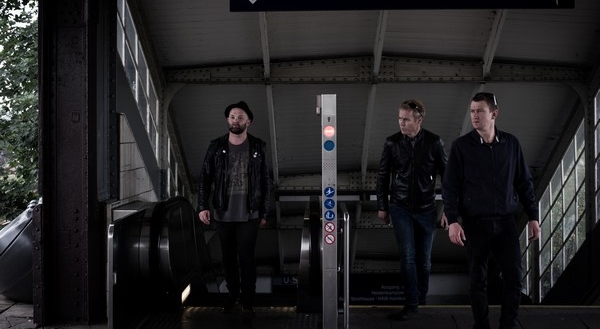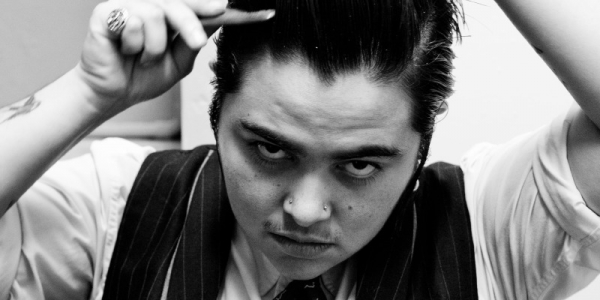So when The Peep Tempel came to write the songs that would appear on the band’s new album, Tales, Scott took inspiration – subliminally at least – from the irreverent discourse with which he’d grown up, blending it with his occasional musing on the world around him to create a set of fictional characters who would emerge on Tales.
“I guess I am a natural social observer, but I’m never anywhere just to observe,” Scott says. “Even though I haven’t had a drink for a couple of months, I’m still quite happy to go to a pub to have a meal. Because I spent a lot of time in pubs when I was young I’m quite comfortable in there. Certainly even when I’m writing lyrics, and building a character with those lyrics, the character I build in my mind doesn’t actually have a face, or isn’t a face of anyone I’ve met. They’re an amalgam of people I’ve met over the journey.”
With an album and EP already under its belt, The Peep Tempel had set up camp in a room above a bar in West Melbourne to write the songs that would eventually appear on Tales. Serendipitously, the building was a stone’s throw from where The Peep Tempel had recorded its first album. “Mates of ours used to have a bar there, so we used the upstairs room – it was a residence, and the guy moved out, so we got a heap of plywood and soundproofed the room the best we could,” Scott says. “We spent a lot of time in there, working through the songs, and did all that pre-production, then pretty well got the songs the way we wanted them. And it was handy always being at the bar – there’d be pints downstairs, and sometimes it was pretty distracting, but we got it done in the end.”
Scott describes the new record as “more dynamic” than the band’s debut album; the presence of bass player Stewart Rayner – who’d joined the band after that first record, and played on the EP – necessarily influenced the structure and style of the songs. “I don’t think we’d been listening to anything really different, though personally I’ve been listening to a lot of X,” Scott says.
A Grant from Arts Victoria provided a robust financial foundation for the record, though Scott says the band was wary of losing its focus as a result of its notional economic security. “Having got the Grant, our main thing was to not go into the studio and over-produce the record – we wanted to play as live as we could,” Scott says. “There’s a little bit of overdubbing on the record, but we still wanted to have that live recording like we did on the first record – so that was the main conscious choice we made.”
Having knocked its songs into shape in the West Melbourne practice room, The Peep Tempel headed to Sing Sing South studios in South Yarra to record the album. As with the first album, the band was keen to capture an honest rock’n’roll aesthetic. “Sing Sing South have got an Atari two-inch tape machine. It’s a great way to record – we hit it pretty hard, so the sound’s spread on there like a thick layer of butter,” Scott says. “And then we had lots of old, nice valve pre-amps. And then our gear: I play a Vox AC30, Stewey used a Fender bass and Steve’s got a great old Pearl kit. We tried to keep it pretty basic – there wasn’t much processing on the record, it was pretty well how the band sounds straight onto tape.”
Scott concedes that his lyrics have an element of social commentary, but with tongue firmly in cheek. “I’m not trying to over-think the lyrics – it’s important to have some humour,” Scott says. “Some of it’s scathing – it can be a bit nasty, but fingers-crossed that people take it the way it’s intended. We’re not trying to offend anyone. But first and foremost it’s the rock’n’roll element that we hope people will pick up on – you want people coming down and tapping their feet. And if people go on from there and discover the lyrics, then that’s a great bonus. I think you’ve got to write songs that you’ll enjoy playing, and therefore people will enjoy hearing. And the lyrics are an enjoyable part that people can pick up on.”
The press release accompanying the record suggests provocatively that the band hopes the record will leave the listener with the slightly ‘ick’ feeling – the sort of feeling that perhaps you might associate with the consumption of greasy food. But in a live setting, Scott says the songs on the album take on a different quality, reflecting the rawness of Peep Tempel’s stage persona.
“The record is different live – the same approach isn’t taken when we’re playing live,” Scott says. “We’re in party mode when we’re playing live, and some of the lyrics that on the record are a little bit dirge-y, live they have a bit more humour to them, it’s more of a celebration. We’re not trying to emulate the record when we play live, we’re more trying to play a live show that’s just us, it’s around what we are as a band.”
BY PATRICK EMERY







